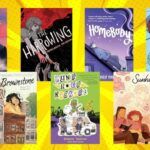
How and What to Read During Mental Health Challenges
If you’re a book lover struggling with depression, anxiety, or other mental health challenges, sometimes your relationship to reading might be impaired. Mental health crises, whether or big or small, can be overwhelming and make it difficult to read, straining your relationship to books. After all, if you’re not reading, you’re not a reader, right? It can certainly feel that way. And if you’re a big reader, that’s a big part of your identity to feel like it’s in jeopardy. In this essay, I’ll discuss some of my strategies honed from my own years battling mental illness for how to continue to read during times of anguish, as well as how to support a reader going through a challenging time with their mental illness.
Not sure what to pick up for yourself or a friend experiencing mental health problems? Here are some ideas about what kind of books to read during mental health challenges. These picks are good ways to keep reading through the darkness.
I especially recommend these choices to anyone doing inpatient psychiatry. Hospital libraries can be hit or miss, and you can’t count on there being a robust selection when you go. That’s why it’s always good to pack your own reading material.
If you’re wondering what to pack to read while you’re staying inpatient, these categories will help you connect with reading while you’re in the process of recovery.
Short Stories
First up, short stories. It can be hard to manage reading a full-length book during a mental health problem. That’s why short stories and short story collections can be a great fit for short attention spans. Just because you can’t concentrate on a long novel doesn’t have to mean you can’t still read. And reading short stories can build momentum in your reading practice while you complete story after story. Read Book Riot’s Best Short Stories of All Time and these 100 must-read contemporary short story collections to get started.
Magazines
Magazines definitely still count as reading and are a good option during troubling times. True, magazines aren’t books, and you can’t record a magazine on Goodreads, but they are words to be read, and that’s the very definition of what we call “reading,” isn’t it? I like choosing a mix between denser writing, like in The New Yorker, and more lighthearted reads, like Vanity Fair. One of the best things you can do if you’re staying inpatient is to leave your magazines behind when you go, if you can bear to be parted from them. It’s a nice way to make sure others can benefit from what you’ve just finished reading and replenish the stock of reading options.
Puzzle Books
Yes, puzzle books are reading, and I for sure recommend bringing a book of puzzles with you. Whether you love sudoku, word searches, or logic puzzles, these bulky books you can get cheap in the grocery aisle or dollar store are great to help you still keep your memory and brain sharp. You might want to check out the series of puzzle books by Nancy Linde, like 399 Games, Puzzles & Trivia Challenges Specially Designed to Keep Your Brain Young, which offer a mix of puzzle types, brain teasers, and fun exercises to flex your brain skills.
Graphic Novels, Manga, and Comics
It can be hard to focus on prose when you’re going through a mental health crisis. Fortunately you can read illustrated books like graphic novels, manga, and comics to engage with reading in a different yet still fulfilling way. I recommend comics, manga, and graphic novels or graphic memoirs to anyone who has a need to read but is challenged by reading books that are straight prose. For ideas on what graphic novels or memoirs, check out Book Riot’s list of 100 must-read graphic memoirs.
Poetry
One time while I was in the hospital, a fellow patient was reading Rupi Kaur’s Milk and Honey. It made total sense; Kaur’s emotions-driven poems capture the intensity of feelings, and intense feelings are the norm on the psych ward. Sometimes you’re craving comfort food when you’re experiencing tough times, but other times you just want to immerse yourself in powerful, emotional writing like poetry. I’m happy to say there’s room for both of these poles in the field of poetry. You can get ideas of where to start with poetry in this list of must-read poetry books.
Thrillers
While waiting for an inpatient bed to open up, I devoured Denise Mina’s Conviction. This propulsive thriller held my attention and made the hours fly by. I didn’t finish the book in the ER, but I did tear through it my first few days on the ward. Thrillers and novels of suspense are solid options if you want to keep reading but feel your attention is under stress. Twisty and unputdownable, the best thrillers are marathon reads in good times and bad. Find recs in our compilation of page-turning gritty thrillers.
These categories of books are good matches for anyone battling mental health stress. If you’re someone who deals with these challenges often, I recommend selecting some books and leaving them on a designated shelf while you’re well. Then you won’t have to overthink it when you’re experiencing mental illness obstacles. Personally, I always have a shelf packed with these categories of books that I already stocked when I’m able to select books for it, so I’m already ready to go. When the time comes to do inpatient or heal in place, I don’t have to expend the mental energy on picking what I want to read.
Helping a friend or loved one through a tough time? Try gifting or loaning books like these to ease the burden of mental illness. It’s important to know that you’re not alone when you’re battling these symptoms. Connecting someone you love who is a big reader with books they can actually read can help them maintain their reader identity.
The bottom line is you don’t have to give up reading when you’re experiencing mental health challenges. You can still read through the episode by choosing books that match your emotional and cognitive needs. Or you can always not read and avoid putting pressure on yourself; you will return to reading when you’re ready. Don’t let mental illness rob you of your love of reading. Something so core to your identity will never leave you for long. You are a reader whether you feel that way or not. You will never lose that passion. Mental illness won’t rob you of it for long. The sun is almost here.
















